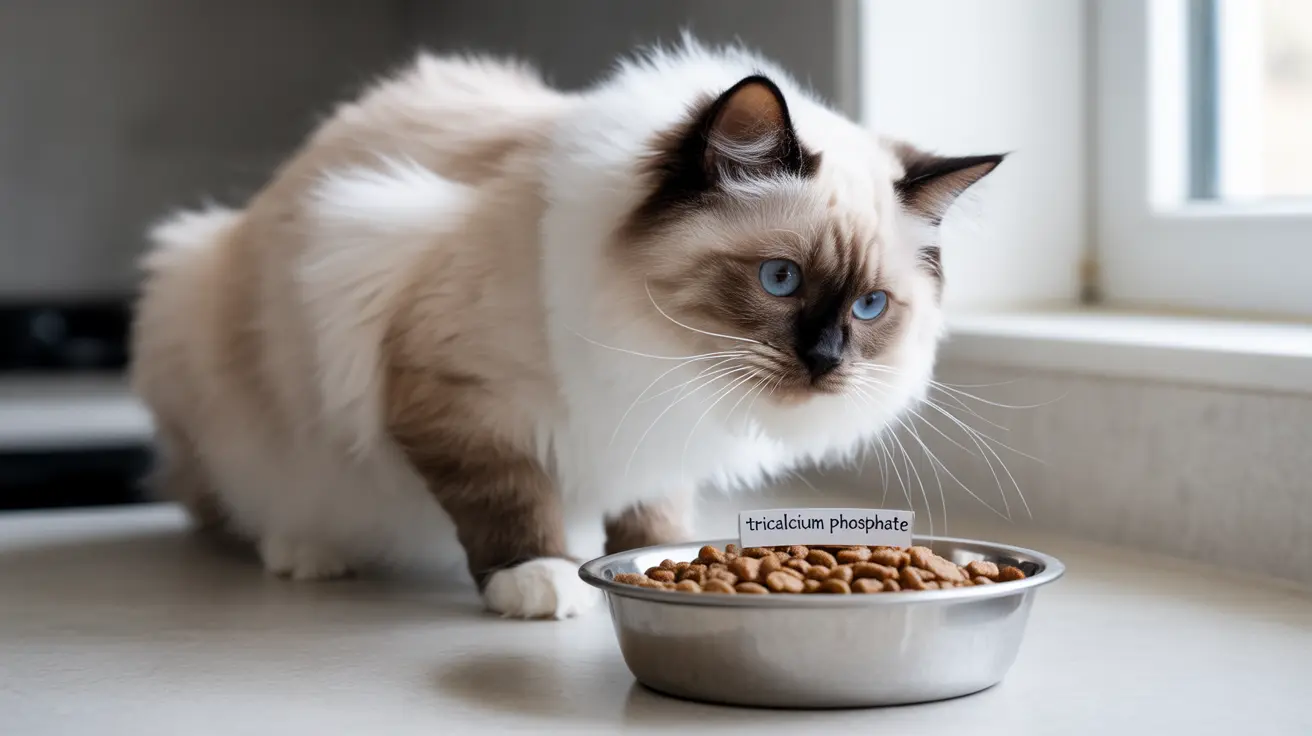Understanding Tricalcium Phosphate in Your Cat's Diet
When examining your cat's food label, you might notice tricalcium phosphate listed among the ingredients. This mineral compound plays a crucial role in pet nutrition, but its presence has sparked important discussions about feline health and safety.
As a mineral additive, tricalcium phosphate serves as a source of both calcium and phosphorus – essential nutrients that support your cat's bone health, muscle function, and energy metabolism. However, recent research suggests that the type and amount of this compound in cat food deserves careful consideration.
The Science Behind Tricalcium Phosphate
Tricalcium phosphate is a calcium salt of phosphoric acid that appears in both natural and synthetic forms. In cat food, it serves multiple purposes: providing essential minerals, preventing ingredient clumping, and helping maintain proper pH levels.
While regulatory bodies consider it generally safe, the key concern lies in its classification as an inorganic phosphate. Unlike organic phosphates found naturally in meat and bone, inorganic phosphates are absorbed differently by your cat's body and may pose health risks when present in high amounts.
Health Implications for Your Cat
Research has revealed important connections between phosphate sources and feline health. Studies show that excessive intake of inorganic phosphates like tricalcium phosphate can potentially contribute to kidney problems, particularly in older cats or those with existing renal conditions.
The calcium-to-phosphorus ratio in cat food is crucial, with experts recommending a ratio between 1:1 and 2:1. When this balance is disrupted, particularly through high levels of inorganic phosphates, cats may face increased risks of kidney disease and mineral imbalances.
Making Informed Food Choices
When selecting cat food, consider these important factors:
- Check the ingredient list position of tricalcium phosphate
- Look for foods with primarily organic phosphate sources
- Consider wet food options, which often contain more natural ingredients
- Pay attention to the overall mineral balance
If your cat has existing health concerns, particularly involving kidney function, consult with your veterinarian about appropriate food choices that minimize inorganic phosphate content.
Monitoring Your Cat's Health
Watch for signs that might indicate mineral imbalances or kidney stress, including:
- Increased thirst and urination
- Changes in appetite
- Lethargy or decreased activity
- Weight changes
- Changes in coat quality
Regular veterinary check-ups can help detect any early signs of problems related to mineral intake or kidney function.
Frequently Asked Questions
What is tricalcium phosphate and why is it added to cat food?
Tricalcium phosphate is a mineral compound added to cat food as a source of calcium and phosphorus. It supports bone health, muscle function, and energy metabolism while also serving as an anti-caking agent in dry foods.
Can tricalcium phosphate in cat food harm my cat's kidneys?
While moderate amounts are generally safe, high levels of tricalcium phosphate, particularly as an inorganic phosphate, may contribute to kidney stress or damage, especially in cats with existing kidney issues or older cats.
How does the calcium-to-phosphorus ratio affect my cat's health?
The ideal calcium-to-phosphorus ratio in cat food should be between 1:1 and 2:1. Proper balance is crucial for bone health, kidney function, and overall mineral metabolism. Imbalances can lead to health problems, particularly affecting the kidneys.
Should I avoid cat foods with high levels of inorganic phosphates like tricalcium phosphate?
While you don't need to completely avoid foods containing tricalcium phosphate, it's best to choose products where it appears lower on the ingredient list and where phosphorus comes primarily from natural, organic sources like meat and bone meal.
How can I tell if my cat's food has safe amounts of tricalcium phosphate and phosphorus?
Check the ingredient list position of tricalcium phosphate - lower positions generally indicate smaller amounts. Look for foods where meat and natural ingredients are primary sources of minerals, and consult your veterinarian for specific recommendations based on your cat's health needs.
Conclusion
While tricalcium phosphate serves important nutritional purposes in cat food, being mindful of its presence and amount can help protect your cat's long-term health. Focus on balanced nutrition from high-quality ingredients, and always consult with your veterinarian about the best dietary choices for your specific cat's needs.






